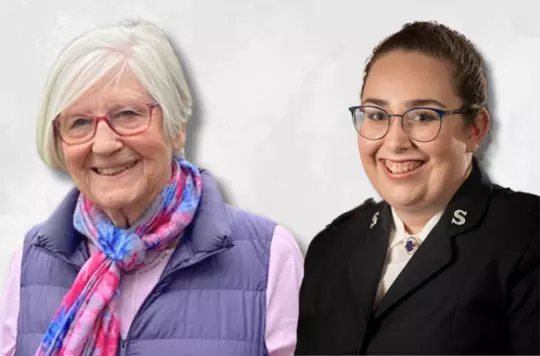11 May 2024
Choosing the right candidate
Major Ian Loxley
Major Ian Loxley considers how we make time for God in our decision-making.
Key text
The disciples experienced unimaginable loss when Jesus was crucified. Many of them – certainly the men who were closest to Jesus – deserted him, and some returned home. However, the risen Jesus revealed himself to them, shared meals with them and restated the promise that, after his ascension, the Holy Spirit would be poured out upon them all.
Having seen Jesus ascend to Heaven,the eleven remaining members of the hand-picked Twelve – along with the women and Jesus’ mother and brothers – obediently moved forward with renewed faith.
Arriving back in Jerusalem from the Mount of Olives, they gathered together with a challenging agenda: to choose a replacement for Judas.
Pause and reflect
- Have you ever felt like Jesus has left you?
- In times of doubt or grief, what would be a better response: distance yourself from him and other believers or get closer to him and others who follow him?
We read that, when they were upstairs in the room, the group were ‘constantly in prayer’ (v14). Prayer had become their priority. Before picking up their agenda, they prayed together. Their prayer was described as constant or, as one translation words it,they ‘were continually devoting themselves to prayer’ (Amplified Bible). Prayer permeated the entire decision-making process.
Pause and reflect
- Do you ever fall into a trap of sandwiching decision-making between formal prayer at the start and finish of the process?
- How can you ensure that your conversation with God continues throughout each day?
- How can you ensure it informs every decision you make?
With the phrase ‘constantly in prayer’, our reading seems to be suggesting that prayer can become an ongoing conversation between God and his people.
It also points out that the believers were of ‘one mind and one purpose’ (v14 AB). This contrasts with the attitude of some of the disciples just a short time earlier, who were looking to confirm their own status in God’s Kingdom by arguing about who would become the greatest (see Luke 22:24–27). Now, the focus is on discovering the will of God in order to implement it, and this unifies the group and gives credibility to their praying.
Pause and reflect
- Unity among believers is crucial, especially in the context of choosing leaders or candidates for specific roles. Demonstrating the agreement of the community gives credibility and accountability. Is there something you could do to ensure unity within your fellowship so that you are truly praying together rather than at cross-purposes?
Peter outlined specific criteria for the selection of Judas’s replacement. The replacement had to be someone who had been present from the time of Jesus’ baptism by John until the Ascension. This clearly demonstrates the importance of considering qualifications and experience when choosing candidates for leadership roles or other responsibilities.
These principles were demonstrated later when seven people were chosen to ‘wait on tables’ so that the apostles could give their ‘attention to prayer and the ministry of the word’. The proposed candidates were ‘full of the Spirit and wisdom’ (Acts 6:2–4).
Pause and reflect
- To have candidates available for ministry who are ‘full of the Spirit and wisdom’, the process of discipling believers is crucial. Jesus spent about three years inspiring and training his disciples. The apostle Paul mentored Timothy to prepare him for leadership within the Church. What role can you play in the training and equipping of people for ministry?
Even though the disciples proposed two candidates, they ultimately trusted in God’s sovereignty to guide the outcome. The casting of lots, which resulted in Matthias being chosen over Joseph, sounds strange to us. It is likely that the candidates’ names were written on stones and placed in a jar. The jar would be shaken until one of the stones came out. This was a recognised method for discerning God’s will and, in those days, it was seen as a totally fair decision-making tool. It also ensured that arguments would not occur once the winner was revealed.
This is the last occasion recorded in the Bible where God’s people cast lots. Today, most Christians believe that the Holy Spirit, who is present in the lives of all believers, will give direction in decision-making.
Pause and reflect
- What important decisions need to be made within your denomination, your congregation and your own life? How do we ensure our decisions are in line with God’s will?
After Matthias was chosen to be an apostle, the group were free to continue their mission of spreading the good news. This underscores the importance of selecting candidates who are committed to the purpose and mission of the organisation or community they will serve. The Church needed to be able to trust Matthias, and Matthias needed to know that he was in the right place.
Although not mentioned again in the New Testament, a number of traditions speak of his faithfulness in preaching the good news of Jesus possibly in Cappadocia or Colchis – modern-day Georgia – or even in Ethiopia. Some say he was martyred and others that he died in old age. Traditions aside, Matthias would have faced persecution and would have suffered because of his faithfulness to Jesus. He needed to know that his calling was of God.
Pause and reflect
- Being obedient to God’s calling was a challenge to the early Christians, and, probably for very different reasons, it is a challenge to us.
- How do you ensure that you remain obedient to God’s calling on your life?
Bible study by

Major Ian Loxley
Chaplain, THQ
Discover more

Major Mark Sawyer talks to Salvationist about candidates and leadership.

Lieutenant Patsy Attwood (Sudbury) and Major Chris Pears exchange their experiences of officership, calling and joyful obedience.


